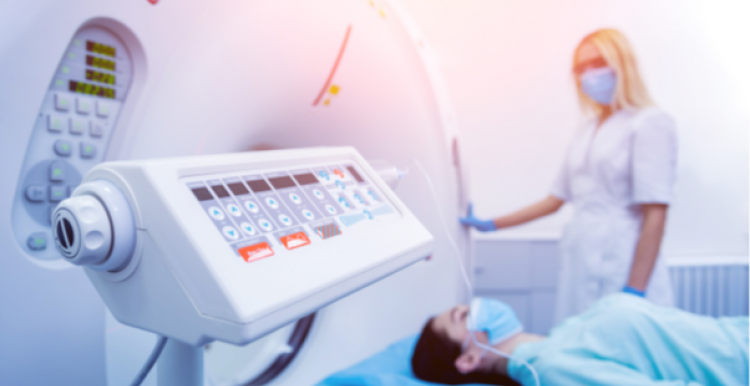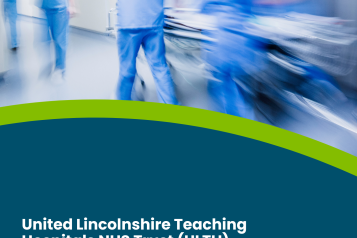ULHT - Restoring our hospital services

Provided and written by NHS Lincolnshire CCG & ULHT
Many of our patients, carers and their families will know that the COVID-19 pandemic has had a big impact on the NHS, and although COVID cases in our hospitals have now reduced we still have a lot of work to do to restore services to the same level they were before the pandemic.
As a result United Lincolnshire Hospitals NHS Trust (ULHT) and NHS Lincolnshire CCG are working closely together to restore hospital services across the county as quickly as possible, and to address waiting times experienced by patients waiting for time-critical surgery. A particular focus is on elective care*, since many services were stood down last year to release theatre staff to support the increased demand on local intensive care units due to COVID-19.
In Lincolnshire, we will work hard to tackle the backlog of patients whose care has been impacted by the pandemic. We need to do this whilst also keeping our patients safe.
We would like to take this opportunity to assure all of our patients, carers and their families that we remain committed to providing the highest quality, safe care for everyone.
How long will I have to wait for my operation?
Unfortunately, at the moment we can’t be certain. The pandemic has had a big impact on the NHS and we are trying to resume services and keep patients safe at the same time as we continue to treat Covid-19 cases. We are reviewing and contacting all patients to understand their current situation and prioritise those in most urgent need. Please be assured that we are trying to resume normal services as soon as possible. Hospitals are doing their utmost to ensure patients receive the treatment they require as soon as possible.
Is it safe to go ahead with my surgery? Will I catch Covid-19 in hospital?
Our hospitals follow very strict rules for preventing all types of infection, including Covid-19. You will be cared for in a low risk area and all patients who are admitted to this area will have had a negative swab test, like you. We have safety measures in place to ensure that our staff are safe, and that suitable personal protective equipment (PPE) and appropriate infection controls are undertaken.
How will I be tested for Covid-19?
The test involves taking a swab of your nose or throat. When we are able to go ahead with your surgery, we will send you clear instructions on how, where and when the test will take place.
Will my family/carer have to isolate with me before I have surgery?
Before you come in for surgery, we will give you clear instructions on the Covid-19 test and how to self-isolate after the test until you come into hospital. The instructions will also cover your family or carer and what they need to do with regard to your surgery.
What if I get worse?
If you have been referred to hospital and are waiting to be seen as an outpatient or inpatient, and your symptoms deteriorate you need to contact the hospital you have been referred to for a specialist to review your referral letter and changing symptoms (see contact numbers for each hospital). Your GP won’t be able to help with getting your referral dealt with any quicker, however they may be able to support with symptom management if your symptoms have worsened.
How do I know if I have been referred?
If you have been referred to a hospital, you will receive a letter from the National E-Referral System (e-RS) or from the hospital directly. If you have not received any correspondence within 4-6 weeks then you can contact your GP practice to check you have been referred, or check on the NHS app. Please be aware that the letter from the e-RS may say you will hear from the hospital within 14 days, unfortunately due to the delays from Covid-19 not all hospitals are able to respond within this time and therefore there may be some extended delays. Referrals are reviewed by consultants within the hospital and patients are prioritised according to their clinical condition
What will happen when I am in the hospital?
Many hospitals have separate facilities for patients undergoing surgery where all patients have been screened for COVID-19. The location of your treatment will be carefully selected. When you are in hospital, you will be asked to wear a mask and all staff will be wearing a mask or other personal protective equipment (PPE) too. If you find it difficult to hear or understand what is being said through the mask, please make staff aware, so that they take this into account and provide alternative ways of communicating with you. Visiting patients in hospitals is now permitted for most areas, but are still subject to some restrictions.
What will happen after my operation?
After your operation, you will be able to recover on the ward. The length of time you spend in the hospital will depend on the complexity of your operation and the speed of your recovery. When you are discharged from hospital, you will normally return to your home. You should have a contact number from your surgical team where you can seek advice if you have any concerns. You should make sure that you follow the instructions in your discharge letter and remain in contact with your GP, who will be aware of any ongoing care or nursing you might need at home. Before you leave the hospital, you should try to find out your options for any follow-up appointments and post-operative visits that you may need. Unless further treatment is needed (e.g., chemotherapy), or there are complications after your operation, follow-up appointments will often take place via video, or over the phone, to reduce the risk of infection. You can speak with your GP in the same way.
If you feel your condition is deteriorating do not hesitate to contact your GP or NHS 111 to get help.


